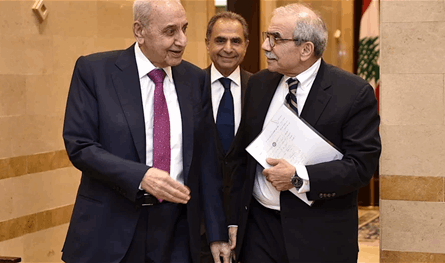A breakthrough in the government file after meeting with Berri
January 18, 2025

Al-Bina stated that meetings and communications will continue between representatives of the Loyalty to the Resistance Bloc and the Development and Liberation Bloc with the President-designate for consultations to reach an understanding on several topics, including the participation of the two in the government within the framework of the broad lines agreed upon by Presidents Berri and Salam, provided that the results of these consultations appear. Early next week, and if it is positive and this is likely, the government will see the light within two weeks maximum.
Al-Akhbar wrote: The negative climate that resulted from the process of naming Judge Nawaf Salam to form the first government of the era began to recede, in the wake of indications that the decision-makers understood the setback and rushed to address it, so that it would not spread to the rest of the files. While everyone was waiting for President Salam to meet with Speaker of Parliament Nabih Berri, the latter inspired a positive atmosphere, noting that “the meeting was promising.” This relieved those who were concerned about the impossibility of formulating an understanding between Salam and the duo Amal and Hezbollah, who agreed to remain together in the government or leave it together. Salam strengthened this atmosphere when he affirmed, “The President and I are reading in one book, which is the constitution amended in accordance with the Taif Agreement.” “This is our only book by which we work together.”
The meeting was preceded by communications that broke the closed circle and put the government formation train on the track. If no negative development occurs, it can be said that “the issue of whether or not to participate has become to some extent behind the duo, and today it is seeking to improve the conditions for its participation in it,” especially since Hezbollah and the Amal Movement sensed Salam’s insistence that the duo not isolate itself from the government. It was learned that the president-designate sent a message to Hezbollah in which he emphasized this climate. Informed sources said, “Two things have been achieved in the past two days. The first was the breaking of the ice that existed, and then the beginning of the unraveling of the contract in light of the response of Presidents Joseph Aoun and Salam. This does not mean that the two men are acting from a position of weakness, but they are dealing objectively and with the background of someone who understands the accuracy of the composition.” . She pointed out that “Aoun said that he would not sign a government that does not include Hezbollah and the Amal Movement, and that Salam is keen for the duo to agree to it,” but the approach to matters this time “will be different.” This explains the words of President Nabih Berri’s political aide, MP Ali Hassan Khalil, who tried in a television interview the day before yesterday to ease the tension by saying: “We are open to a positive dialogue with the Prime Minister-designate, and all the skeptical talk is incorrect. “We simply had a candidate and he lost.”
Sources familiar with Berri and Salam’s meeting revealed that “the latter left Ain al-Tineh comfortably, and confided to those who asked him that he had told President Berri that he had hoped to form a mini-government. However, he sensed from the discussions with the parliamentary blocs that this is not possible, and he will return to forming a government of 24 ministers. However, he “insists on a government that includes specialists,” noting that “Berri did not express an objection to that,” and therefore Salam showed satisfaction with the climate of understanding. Pointing out that the meeting was a milestone that helped turn things around from a dark climate to a promising one.
In the evening, Berri confirmed in statements to Al-Jadeed that the political track in Lebanon is heading towards a solution, indicating that “the Prime Minister is cooperating,” but he did not go into details about the portfolios or names with Salam. Regarding whether the next government will be a political party or a technocrat, Berri stressed that “determining the form of the government is the prerogative of the president-designate.” Regarding the Shiite duo’s participation in the government, Berri indicated that “the duo agrees to the names presented by the president-designate on the condition that the proposed person is competent, but if he is not, he will be rejected, even if he is a good man.” He stressed his position of not accepting the isolation of any political component in Lebanon, saying: “We did not accept the isolation of any component previously and we will not accept it today,” indicating that “no one accepts the isolation of Hezbollah (…) as long as it is in God in heaven, and Hezbollah is on earth.” ».
While Salam is trying to work carefully without giving many details, Al-Akhbar learned that an agreement was reached on broad lines to move towards broader understandings, with Salam adhering to his “independence” and defending a wide margin in determining the features of the government he wants to form. Among these lines is that the government will not include party figures in the traditional sense, but it will consult with the political forces regarding the names, and these forces can present names for personalities that are acceptable, or reject names that they consider inappropriate. There is talk of the desire of the prominent powers to keep the distribution of portfolios according to the current formula, with some modifications, as the duo insists on not leaving the Ministry of Finance, knowing that Salam has a different vision, which will appear after his consultation with President Aoun, from whose circles no words have come out about his vision of the shape of the portfolio. the government.
There was also a discussion among the prominent forces about the decision-making mechanism in the Council of Ministers, in which the alliances will be somewhat different from the previous ones, as there will not be a “third guarantor” for anyone. Therefore, the mechanism will take care that no party feels that it controls the decision or that it has no influence. Among the formulas proposed is that “the decision will be made according to the files. If they are files to conduct the work of citizens and the state, the decision will be taken by voting, but if the decision is related to sensitive files, the government must make a decision by consensus.” While sources concerned with the negotiations said that the ministerial statement would not be a problem, they confirmed that the interpretation of Resolution 1701 has been agreed upon and its implementation is limited to the south of the Litani, and as for the issue of appointments, there is no talk about it now.
Hamih: Reconstruction is the government’s duty in accordance with ministerial plans and decisions









